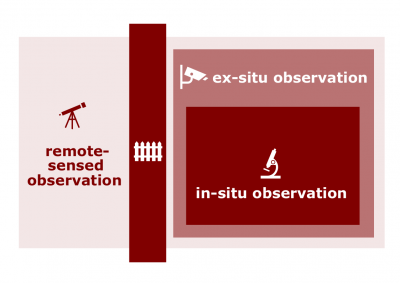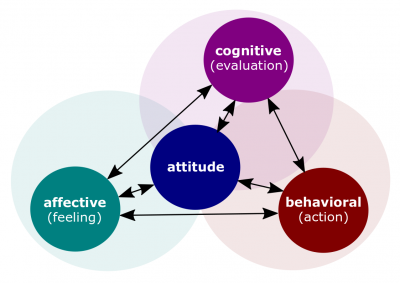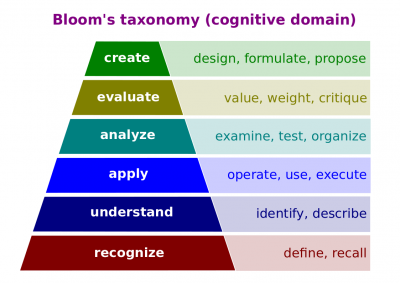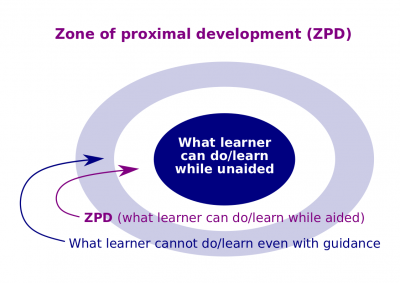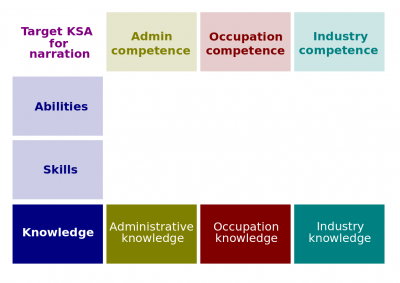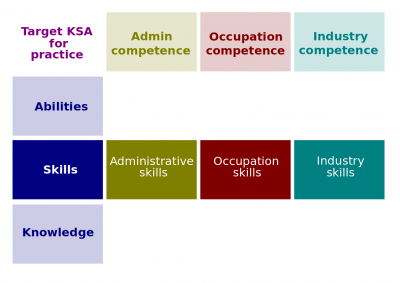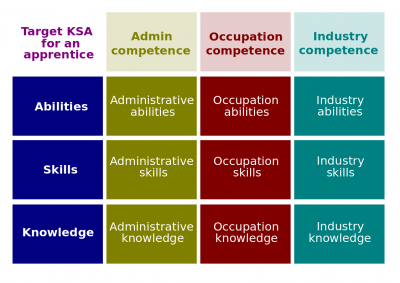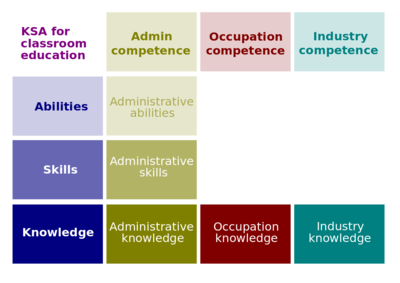Book of KSA Projects
Introduction to Education (hereinafter, the Session) is a learning session introducing its participants to education and related topics. The Session consists of five presentations, each of which is followed by a quiz. The official version of the Session is published at CNM Cert. Its materials are also published at CNM Page, CNM Wiki, and various channels for marketing and convenience purposes.
The Session is the fifth of eight sessions of CNM Cyber Orientation.
Contents
Outline
Introduction to Careers is the predecessor session.
Education Essentials
- Main wikipage: Education Essentials; video (6:03)
- Learning. Any process of acquiring new, or modifying existing, behaviors, preferences, values, understandings, knowledge, skills, and abilities (KSA), as well as a result of that process.
- Purposeful learning. Learning that is undertaken with the purpose of learning.
- Occasional learning. Learning that occurs occasionally, without special intent.
- Observation. An act of recognizing and noting any subject, fact, occurrence, situation, and/or state of affairs, sometimes involving measurement with instruments, as well as the data-gathering technique that is based on watching something or someone.
- Observational learning. Learning that occurs as a function of recognizing, noting, retaining, and replicating behavior observed in one's environment or other people.
- Social learning. Learning from other people, both observational and through learning content delivery.
- Education. The process and/or product of facilitating one's acquisition of KSAs.
- Formal training (formal education). The education that is delivered under a formal curriculum and calendar that is officially approved usually by the government or some accreditation body. In most of contemporary countries, formal training consists of compulsory education and post-secondary education.
- Compulsory education. The part of formal training that is imposed by government and, with some exceptions, required of all people. In most of contemporary countries, compulsory education consists of primary education and secondary education.
- Individualized learning. One's learning based on one's individualized curriculum.
- Informal learning (independent learning). Any activity involving the pursuit of understanding, knowledge or skill which occurs without the presence of any approved curriculum.
- Curriculum. The aggregate of learning content and learning sequence of a particular course of study or all the courses offered by an educational institution, or their brief description.
- Prescripted curriculum. Any curriculum that is externally imposed in advance.
- Individualized curriculum. Any curriculum tailored to meet the needs of a particular learner.
- Learning content. The object of one's learning that is contained in something written, spoken, visualized, or created in any other way.
- Lecture. An oral presentation intended to deliver learning content or teach people about a particular subject. Usually, lectures are structured, prepared in advance and delivered by a credentialed lecturer, for instance, a college professor.
- Textbook. A compilation of learning content in a particular area of study.
- Development domain. One of three domains that group educational objectives according to their bases: (a) cognitive domain for development of knowledge, (b) affective domain for development of emotions, and (c) psychomotor domain for development of actions.
- Cognitive domain. The development domain that groups those educational objectives that target development of knowledge.
- Affective domain. The development domain that groups those educational objectives that target development of emotions.
- Psychomotor domain. The development domain that groups those educational objectives that target development of actions.
- Educational objective. A goal of gaining specified knowledge, skills, and abilities by a learner as a result of a specified learning activity or a set of activities.
- Bloom's taxonomy. One of attempts to classify educational objectives.
- Zone of proximal development (ZPD). An educational construct that indicates the area that a learner can learn only if he or she is helped by a more competent other. ZPD lies in between the area that the learner can learn on his or her own and the area that the learner cannot learn even with the more competent other's assistance.
- Training. The organizing of one's learning.
- Knowledge-focused training. The training that focuses on building learner's knowledge, especially work-related knowledge. The training that focuses on building learner's skills, especially work-related skills.
- Skills-focused training. The training that focuses on building learner's skills, especially work-related skills.
- Abilities-focused training. The training that focuses on building learner's abilities, especially work-related abilities.
Educational Methods
- Main wikipage: Educational Methods; video (8:23)
- Educational method. An established procedure for one's education. These procedures are usually based on observation and direct experience. They can be grouped in several categories: narrated instruction, practical instruction, cognitive research, experiential learning, or any combination of those.
- Learning activity. Something that a learner does or is offered to do for his or her learning.
- Learning sequence. Any sequence of learning activities or educational objectives that any human-learning theory or one's intuition suggests.
- Learning content delivery. Any educational method such as narrated instruction or demonstrating that is based on direct delivery of learning content.
- Demonstrating. Any learning content delivery, in which learning content is delivered through one or more demonstrations.
- Job shadowing. Any combination of (a) demonstrating of one's routine behavior in the workplace, (b) first-hand explanation of that behavior, and (c) answering questions related to that demonstration that aims to provide the learner or learners with sufficient insight of the work.
- Narrated instruction. Any educational method that is based on some narration such as lecturing and storytelling.
- Lecturing. Any narrated instruction that is based on one or more lectures.
- Storytelling. Any narrated instruction that is based on telling stories related to the subject of learning.
- Practical instruction. Any educational method that is based on prescribed practical exercises related to the subject of learning.
- Hands-on training. Any practical instruction that is based on completion hands-on assignments according to step-by-step instructions.
- Guided experiment. Any practical instruction that is based on executing some experiments according to step-by-step instructions.
- Cognitive research. Any educational method that is based on experience that requires cognitive analysis, synthesis, and/or evaluation of the subject of learning.
- Formative assessment. An educational method that is based on assessment that is formatted to provide detailed feedback afterwards, possibly during debriefing or a lessons learned session. Learners may also be encouraged to either complete specified assessment activities or obtain specified scores on them.
- Substantive discussion. An educational method that is based on one or more discussions on the matters that go beyond conventionally-formalized concepts, possibly followed by debriefing or a lessons learned session.
- Socratic method. An educational method that is based on critical thinking while answering challenging questions related to the subject of learning.
- Elicitation technique. An established procedure for gathering data from human beings. Elicitation techniques are used in anthropology, cognitive science, counseling, education, knowledge engineering, linguistics, management, philosophy, psychology, and other fields. A person who interacts with human subjects to elicit information from them is called an elicitor. The most common techniques include interviews, brainstorming, focus groups, artifact testing, observation, and questionnaire survey.
- Experiential learning (activity-based learning, learning by doing, learning through play). Any educational method that is based on both direct experience and cognitive reflection on that experience. Those methods may include a wide range of techniques from observations to experiments and heuristics, but the following consideration of what was observed and what can be learned is the key. That methodology may also be defined as learning through reflection on doing.
- Project-based learning (problem-based learning). An educational method that is based on experiential working on real-world projects related to the subject of learning.
- Exploratory research. An educational method that is based on completing one or more researches that relate to the subject of learning, but which procedure cannot be fully prescribed and which results cannot be completely estimated.
- Learning through failure. A heuristic to utilize experience for learning.
- Case-based learning. An educational method that is based on usage of decision-forcing cases to put students in the role of people who were faced with difficult decisions at some point in the past. In sharp contrast to many other educational methods, the case method requires that instructors refrain from providing their own opinions about the decisions in question. At the same time, instructor's feedback may be provided during the following debriefing or a lessons learned session.
Learning Environments
- Main wikipage: Learning Environments; video (9:54)
- Learning environment. The circumstances, objects, and conditions by which the learner is surrounded.
- Social-learning theory. The view that we can learn through both observation and direct experience.
- Self-education (autodidacticism, autodidactism, self-learning, self-directed learning, and self-teaching) is education without the guidance of masters (such as teachers and professors) or educational institutions. A self-learner chooses the subject of study, their learning tools, and educational format.
- Managed learning environment (MLE). A computer-based ecosystem that supports core learning activities such as assessment, authoring, communication, learner progress tracking and, possibly, more advanced options. The scope of those advanced options varies greatly; they may or may not include collaboration, e-portfolio building, hands-on training, on-the-job training, etc.
- Educational format (study mode or mode of study). The layout of one's education. This layout include organization of roles, functions, technology, and other arrangements for the educational process.
- Traditional classroom. Any educational format that is based on a regular classroom in which a teacher narrates educational topics while using some board or display for demonstrating and one or more students listen to him or her.
- Flipped classroom. Any educational format that is the opposite of a traditional classroom. The students are supposed to review pre-recorded lectures or use other learning tools outside of the classroom. The teacher usually facilitates learning activities such as practical instruction, cognitive research, and/or experiential learning in the classroom.
- On-the-job training. Any educational format that is based on training provided at the workplace. This training can be anything from time to think on work problems and/or use related learning tools and up to one-on-one mentoring.
- One-on-one mentoring. Any educational format that is based on a relationship between one mentor and one student.
- Study group. Any educational format that is based on a group of students that gathers to learn specified topics. Study circles use a similar format, but their topics are more vague.
- Residency-based study. One's study of a particular subject and/or skills and abilities related to that subject in real-world environments under the direct or indirect supervision of a more competent other similar to residency training. Residency-based study can be considered as residency training in a smaller scale.
- Guided independent study. One's study of a particular subject and/or skills and abilities related to that subject under the guidance of a more competent other.
- Learning tool. Any tool helpful in learning. Those tools may include (a) printed materials such as books, textbooks, handouts, articles, study guides, technical documentation; (b) audio materials such as audio files, collections, or natural experiences; (c) graphic materials such as illustrations, charts, real objects, photographs; (d) audiovisual materials such as video files, collections, natural and/or multimedia experiences; (e) special software such as managed learning environments, MOOCs, document collaboration systems, learning games, etc.
- Course. A path of something. In the United States, course often refers to a course of study of one subject within one academic term, which is a quantifiable unit of instruction. In education, generally, a course of study refers to the academic major.
- MOOC. A kind of computer-aided education that represents a massive open online course aimed at unlimited participation and open access via World Wide Web.
- Learning management system. A system such as CNM Cert for the administration, documentation, tracking, reporting and delivery of educational courses, training programs, or learning and development programs. Usually, this system is built on e-learning software such as CNM Certware.
- Document collaboration system. A system such as CNM Wiki for collaborative design, development, and storage of textual documents. Usually, this system is built on one or more wiki engines such as CNM Wikiware.
- Learning arrangement. A particular way in which learning tools, educational formats, educational methods, elicitation and other techniques are put together to facilitate one's learning. The arrangements may include learning games, competitions, role plays, simulations, field trips, and other settings arranged to stimulate one's observations and direct experiences.
- Computer-aided education. Any educational format that uses learning management system based on some software. This format can complement any other learning arrangement.
- Internship. A period of professional experience offered by an organization for a limited period to students enrolled into programs related to that profession. Internship can be considered as a complement to formal training; for some students, especially those in the medical field, internship is a requirement for an educational credential.
- Gap year. A one-year hiatus from academic studies to allow for nonacademic, usually experiential learning activities.
- Apprenticeship. An arrangement in which someone called an apprentice learns on the job and, often, at some educational institution. Apprenticeship can also refer to the position of an apprentice.
- Field immersion. The act of immersing or the state of being immersed in the subject of study, as well as instruction based on extensive exposure to surroundings or conditions that are native or pertinent to the object of study.
- Residency training (in medical education, also known as postgraduate training or, simply, residency). One's training in a broad set of skills and abilities related to a particular profession in real-world environments under the direct or indirect supervision of a more competent other. In many jurisdictions, successful completion of such training is a requirement to obtain an unrestricted license to practice the profession.
Educational Credentials
- Main wikipage: Educational Credentials; video (8:38)
- Educational credential. A credential that confirms one's education. Some educational institutions offer educational programs especially in creative arts and the medical field that combine credentialing of academic achievements and professional experience.
- Registered apprenticeship. In the United States, apprenticeship that is registered and overseen by a government organization. In some states, this organization is the United States Department of Labor; similar state bodies register and oversee registered apprenticeships in the other states. Those organizations issue educational credentials to the graduates from the registered apprenticeships.
- Academic credential. An educational credential that is issued by an educational institution or credentialing organization to certify specific academic achievements traditionally related to someone's knowledge.
- High school diploma. An academic credential that certifies that someone has been graduated from a high school.
- GED (General Equivalency Diploma). A credential that certifies that someone has successfully passed the test that covers United States or Canadian high school-level academic skills.
- Diploma. A certificate or deed issued by an educational institution, such as college or university, that testifies that the recipient has completed a particular course of study.
- Associate degree (or associate's degree). An undergraduate academic degree awarded by colleges and universities upon completion of a course of study intended to usually last two years or more.
- Bachelor's degree. An undergraduate academic degree awarded by colleges and universities upon completion of a course of study lasting three to seven years depending on institution and academic discipline.
- Master's degree. A graduate academic degree awarded by colleges and universities upon completion of a course of study lasting one to three years beyond the coursework required by a Bachelor's degree.
- PhD (Doctor of Philosophy, also known as PhD degree or Ph.D.). The highest, terminal academic degree awarded by universities in most countries. The requirements to earn a PhD regularly include comprehensive examinations and work on thesis or dissertation based on extensive research.
- Professional degree. A degree that prepares someone to work in a particular profession, often meeting the academic requirements for licensure or accreditation.
- Credentialism (academic inflation). The process of the devaluation of educational qualifications because of the needs of educational institutions to increase revenues and cut expenses, on one side, and increasing demands, on the other side. This process further provokes credential creep.
Educational Service Providers
- Main wikipage: Educational Service Providers; video (5:29)
- Educational institution. An enterprise, usually an organization or its constituent part, that exists to provide the public with education.
- Preschool (nursery school, kindergarten). An educational institution that offers early childhood education to children before they begin compulsory education at primary school.
- Elementary school (primary school). An educational institution that offers initial or primary compulsory education, in the United States and Canada, from the age of about seven to twelve. Students usually attend elementary school after preschool and before secondary school.
- Secondary school (in the United States, a combination of middle school and high school). An educational institution that offers compulsory education beyond its primary level that is offered at elementary school. In the United States and Canada, the students of secondary schools are from the age of about twelve to eighteen.
- Tertiary school (college, university, post-secondary school). An educational institution that facilitates learning beyond compulsory education and awards academic credentials higher than high school diplomas.
- Vocational school (trade school, career center, or vocational college). An educational institution that facilitates learning beyond compulsory education, but does not award academic credentials higher than high school diplomas. Instead, vocational schools concentrate on those occupations that do not require advanced academic credentials and those KSAs that are needed to start working in those occupations.
- Educational service provider. An enterprise, usually an organization or its constituent part, that provides anyone or anyones with education regardless of what this enterprise generally does. The providers include both educational institution and enterprises that are not in any educational business.
- Workforce developer. Any entity in the business of workforce development.
- Workforce development. The process of developing workforce.
- Apprentice-hosting employer. The employer that hosts one or more apprentices.
In the CNM Cyber Orientation, the Introduction to Careerprise is the successor session. So is the Introduction to CNM Agile in the CNM Cyber Orientation.
Preview presentations
Video
- The video preview presentation, 1:37 minutes, is published at https://youtu.be/LrUmDbuDfFc. Here is its full text:
In this session we will talk about educational essentials, what is education, formal training, compulsory education. We will start by education objectives, we will take a look at Bloom`s taxonomy of education objectives, we will discuss different domains of them, the effectiveness of them.
We will touch educational methods including narrated instruction, practical instruction, cognitive research and experiential learning. Then we will go to learning environments. We will touch educational formats, leaning tools including, learning management systems and document collaboration system which are widely used right now.
Then we will go to learning arrangements such as internships, apprenticeships, elicitation techniques, anything which can be created with elicitation techniques. We will touch education credentials including academic credentials and we will end with academic service providers.
Hopefully we will be ready to go to carrier price services.

